Sometimes, make's output fills the screen. It's a little bit hard to identify all the warning and error message lines. I know may shell color output can help Can anyone can help me?
-
1If you are only interested in error and warnings, then you can simply grep those. And grep will also color "warning" and "error" :D. – Priyank Bhatnagar Jun 22 '11 at 08:39
-
3To do what Priyank suggests: `make 2>&1 | grep -E --color=always 'error|warning|$'`. The $ is there to match every line so that you see all output, but only the 'error' and 'warning' strings will be highlighted. – richardr Apr 10 '14 at 14:59
-
See also [c++ - Improving g++ output - Stack Overflow](https://stackoverflow.com/questions/5732562/improving-g-output) if you're using g++. – user202729 Jul 14 '19 at 14:23
9 Answers
Have a look at colormake, found here
$ apt-cache search colormake
colormake - simple wrapper around make to colorize output
Using the power of google, I also found this bash-function.
make()
{
pathpat="(/[^/]*)+:[0-9]+"
ccred=$(echo -e "\033[0;31m")
ccyellow=$(echo -e "\033[0;33m")
ccend=$(echo -e "\033[0m")
/usr/bin/make "$@" 2>&1 | sed -E -e "/[Ee]rror[: ]/ s%$pathpat%$ccred&$ccend%g" -e "/[Ww]arning[: ]/ s%$pathpat%$ccyellow&$ccend%g"
return ${PIPESTATUS[0]}
}
- 3,379
- 1
- 25
- 40
- 44,604
- 7
- 83
- 130
-
3the pathpat given here didn't quite work for me, so I used pathpat="^.*:[0-9]+" instead – Wade Mar 12 '12 at 19:42
I have came to this questions searching for a solution to colorize make output and then remembered a while back I have researched a good generic log colorizer and found ccze. It works with anything I throw at it from Minecraft server logs to Exim MTA.
make | ccze -A
NOTE: specifying -A option enables 'raw-ansi' otherwise some output is 'cleared' at end of run in my experience.

- 11,982
- 4
- 69
- 55
-
-
4Who needs a "plugin" when you have a pipe? Being able to pipe programs (those things people now call "apps" for some reason :P) together is perhaps 'the' core of the Unix philosophy. Any proper pipe-receiving program should have no problem doing stuff with the output of GNU `make`; certainly, the ones I've just tested work great. – underscore_d Dec 15 '15 at 00:30
If you're an emacs user, you can use the command M-x compile. This puts the make output in a highlighted buffer, with errors acting as links to the relevant line in the source code.
- 12,157
- 12
- 50
- 84
How about the following?
It is produced by a simplified version of this Makefile.
PROJECT = programname
SHELL = /bin/bash
OBJS = $(patsubst src/%.cc,obj/%.o,$(wildcard src/*.cc))
RESET = \033[0m
make_std_color = \033[3$1m # defined for 1 through 7
make_color = \033[38;5;$1m # defined for 1 through 255
WRN_COLOR = $(strip $(call make_std_color,3))
ERR_COLOR = $(strip $(call make_std_color,1))
STD_COLOR = $(strip $(call make_color,8))
COLOR_OUTPUT = 2>&1 | \
while IFS='' read -r line; do \
if [[ $$line == *:[\ ]error:* ]]; then \
echo -e "$(ERR_COLOR)$${line}$(RESET)"; \
elif [[ $$line == *:[\ ]warning:* ]]; then \
echo -e "$(WRN_COLOR)$${line}$(RESET)"; \
else \
echo -e "$(STD_COLOR)$${line}$(RESET)"; \
fi; \
done; exit $${PIPESTATUS[0]};
.PHONY: $(PROJECT)
$(PROJECT): bin/$(PROJECT)
bin/$(PROJECT): $(OBJS)
@mkdir -p bin
@echo g++ -o $@ $(OBJS) -Iinclude
@g++ -o $@ $(OBJS) -Iinclude $(COLOR_OUTPUT)
obj/%.o: src/%.cc
@mkdir -p obj
@echo g++ -o $@ -c $< -Wall -Wextra
@g++ -o $@ -c $< -Wall -Wextra $(COLOR_OUTPUT)
It assumes all C++ source files are in the src directory (extention .cc) and header files are in the include directory.
- 3,819
- 1
- 28
- 31
I used to use multitail for log files it can highlight (and filter) lines based on various criteria.
- 26,565
- 10
- 94
- 165
- 50,406
- 14
- 85
- 110
On Mac, it worked by printing tput color codes around the error string.
First export tput color codes as below:
export red=`tput setaf 1`
export reset=`tput sgr0`
then, add a target to Makefile as below:
...
check-env:
ifndef ENV
$(error ${red}ENV is undefined. Please export it using command [ export ENV=dev ]${reset})
endif
...
then, run it as make check-env
- 1,538
- 3
- 19
- 17
GCC has an environment variable for that:
export GCC_COLORS='error=01;31:warning=01;35:note=01;36:caret=01;32:locus=01:quote=01'
- 61
- 6
I recently looked into this for our team and I modified the source of make to produce output where CL.EXE (Windows) output get the text 'warning' and 'error' in a color using ANSI escape codes.
I dropped it on github here: https://github.com/XtheOne/make-colorized
It could be further developed by making the words that needs replacing configurable as parameter or in a file. But for now it works just fine for us.
- 11
- 2

